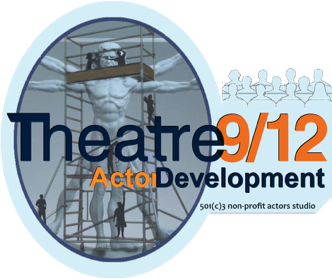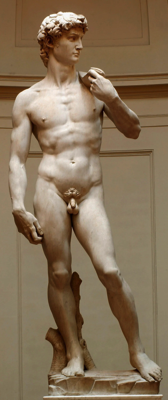
THEATRE9/12 is a 501(c)3 not-for-profit actors' studio for continued training and the facilitation of actors' productions
Artistic Director: Charles Waxberg
Artistic Associate: Terry Edward Moore
Producing Director: Paul O'Connell
Charles@Theatre912.com (206) 332-7908
What Is Acting Technique?
a personal point of view

"I just look at the marble and cut away everything that isn't David."
--Michelangelo's response to the curious as to how he carved his masterpiece.
I began acting when the "American method," as it has come to be called, was most prevalent. Personally, I found it self-indulgent and invasive when I came to theatre to add to my life, not relive every moment I'd already experienced—limited by my youth then. When asked by directors or teachers to summon my personal memories, I'd "cheat" by substituting my imagination and compassion, pretending it was my past. Until I met Stella Adler. She was the only American to have studied with Konstantin Stanislavsky—in intense, daily partnership—and she brought his most advanced studies to the United States.
Stanislavsky was surprised to learn that emotional-recall and affective memory were being misinterpreted and over-emphasized. He showed Miss Adler that the truth is in the imagination—all human experience is within one's compassion—and when coupled with the physical embodiment of the character's actions she will be most activated to experience the play. And when the play is real, the identification of that actor's experiences then transfers to the imaginative truth of the given circumstances, and she is flooded with great passion. "You can't create an emotion," he said, "you have to trick it."
Imagination is the soul of all art, not just acting, and I believe the script is the blueprint for an actor's imagination. If we put the script first, not the scriptwriter, but the script—that abstract compilation of actions and ideas from which every cast and crew member works—then we bring this heightened world to its richest life. If the script is first, then ego, self-consciousness, and personal desire become second to nursing the play to breathing, captivating life. The production with the script at its center defines theatrical collaboration.
The imagination is limitless; our lives are limit-ed. Our compassion is limitless; our experiences are limit-ed. Art takes us out of human limitations and allows us to live lives, feel emotions, experience times and places, and enact heroic deeds or vile atrocities or goofy goofs that our personal life boundaries could not allow.
The technique of acting, developed over thousands of years, passing through countless generations, identified methods of making these vastly different worlds not only real to us actors, but exciting to an audience. It's a craft, as every art demands, and it is a teachable process: not a mystical energy that only a "guru master" can coax out of you. Technique has specific tools that inspire the imagination and talent of the artist. The mysterious, unexplainable part is talent, the gift we receive at birth; technique is the specific process through which our talent expresses its most effective powers.
The technique and skills for MODERN acting began with Stanislavsky and are still being developed as new playwrights pose new challenges for us to imbue with the truth of our human experience: an unmasterable ideal and a lifetime study and exploration.
—Charles Waxberg
Enter Text